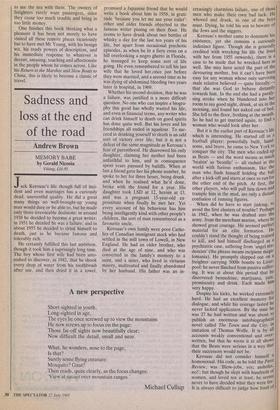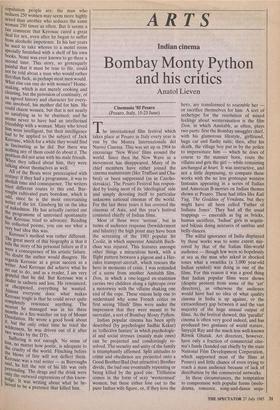Sadness and loss at the end of the road
Andrew Brown
MEMORY BABE by Gerald Nicosia
Viking, £10.95
Jack Kerouac's life though full of inci- dent and even marriages has a curiously dead, uneventful quality. He did a great many things no well-brought-up young man would dare or be able to, but he made only three irrevocable decisions: in around 1938 he decided to become a great writer; in 1951 he decided he was a failure; and in about 1955 he decided to drink himself to death, just as he became famous and tolerably rich.
He certainly fulfilled this last ambition, though it took him a suprisingly long time. The boy whose first wife had been asto- nished to discover, in 1942, that he shook every drop of water from his toothbrush after use, and then dried it in a towel, promised a Japanese friend that he would write a book about him in 1958, in grati- tude 'because you let me use your toilet': other and older friends objected to the famous writer pissing on their floor. He seems to have drunk about two bottles of whisky a day for the last ten years of his life, but apart from occasional psychotic episodes, as when he lit a fiery cross on a hill overlooking a negro ghetto in Florida, he managed to keep some sort of life going. He even remembered to tell his last wife that he loved her,once just before they were married, and a second time as he was dying of abdominal bleeding two years later in hospital, in 1969.
Whether his second decision, that he was a failure, was justified is a more difficult question. No one who can inspire a biogra- phy this good has wholly wasted his life; and even in financial terms, any writer who can drink himself to death on good spirits has done quite well. But his loves and his friendships all ended in squalour. To suc- ceed in drinking yourself to death is an odd sort of victory over life; but it is not a defeat of the same magnitude as Kerouac's fear of parenthood. He disavowed his only daughter, claiming her mother had been unfaithful to him, and in consequence spent years pursued by bailiffs. When at last a friend gave her his phone number, he spoke to her for three hours, being drunk, and when he realised what he'd done, broke with the friend for a year. His daughter took LSD at 12, heroin at 13, and was a pregnant 15-year-old ex- prostitute when finally he met her. Yet every account of his behaviour has him being intelligently kind with other people's children, the sort of man remembered as a favourite uncle.
Kerouac's own family were poor Catho- lics of Canadian immigrant stock who had settled in the mill town of Lowell, in New England. He had an older brother, who died at the age of nine, and who was converted in the family's memory to a saint, and a sister, who lived in virtuous misery, maltreated and finally abandoned by her husband. His father was an in- creasingly charmless failure, one of those men who make their own bad luck. He whored and drank, as one of the boys must. Dying, he told his son to beware of the Jews and the niggers. Kerouac's mother came to dominate his existence, yet she remains a curiously indistinct figure. Though she is generally credited with wrecking his life (he lived with her from 1955 onwards), there is a case to be made that he wrecked hers as well. She may have acted the part of the devouring mother, but it can't have been easy for any woman whose only surviving male relative believed — quite literally — that she was God to behave distantly towards him. In the end she had a paralY- sing stroke when he blundered into her room to say good night, drunk, at six in the morning, and found her naked out of bed. She fell to the floor, frothing at the mouth. So he had to get married again, to find a woman who would look after her.
But it is the earlier part of Kerouac's life which is interesting. He started off as a football player: powerfully built, hand- some, and brave, he came to New York to conquer the city. The men who ended 1.113 as Beats — and the word means as mud' 'beaten' as 'beatific' — all rushed at the world with furious enthusiasm, like the man who finds himself holding the ball after a kick-off and starts at once to run for the other end of the pitch. At first, the other players, who will pull him down and trample him in the mud, are only a distant confusion of running figures. • When did he have to start jinking, to. avoid the first clusters of trouble? Perhaps in 1942, when he was drafted into the army, from the merchant marine, where he showed great courage. He seemed perfect material for an elite formation. He, couldn't stand the thought of being trained to kill, and had himself discharged as a psychiatric case, suffering from 'angel ten- dencies' (the phrase means incipient mega- lomania). He promptly shipped out on a freighter carrying 5001b bombs to Liver' pool: he never flinched from passive suffer- ing. It was at about this period that he discovered benzedrine, marijuana, ja7:7' promiscuity and drink. Each made hin" very happy. Despite his kicks, he worked extremetY hard. He had an excellent memory for dialogue, and while his courage lasted lle never lacked application. By the time he was 27 he had written and was about to publish an enormous autobiographic novel called The Town and the City, tn, imitation of Thomas Wolfe. It is by all accounts weakly conventional and over- written, but that he wrote it at all shows that the Beats were serious in a way that their successors would not be.
Kerouac did not consider himself a homosexual. His code, as he told the Para Review, was 'Blow-jobs, yes; assholes.. no!'; but though he slept with hundreds ot women, and loved ten at least, he seems never to have decided what they were for. It is always difficult to judge how fond of copulation people are: the man who seduces 250 women may seem more highly sexed than another who seduces the same woman 250 times as often. But it seems a fair comment that Kerouac cared a great deal for sex, even after he began to suffer from alcoholic impotence. In his last years he used to take whores to a motel room Specially furnished with a shelf of his own books. None was ever known to go there a second time. This story, so grotesquely Painful that it must be true to life, could not be told about a man who would rather flirt than fuck, as perhaps most men would. What else can one do with women? Home- making, which is not merely cooking and cleaning, but the provision of continuity, of an agreed history and character for every- one involved, his mother did for him. He could charm women, but that is not nearly SO satisfying as to be charmed; and -he seems never to have had an intellectual friendship with a woman. Many who loved him were intelligent, but their intelligence had to be applied to the subject of Jack Kerouac, which for a while they would find aS fascinating as he did. But there was nothing any of them could do about it. The problem did not arise with his male friends. When they talked about him, they were talking about themselves as well.
All of the Beats were preoccupied with ecstasy: if they had a programme, it was to abolish time and consequence. The writers tried different routes to this end. Bur- roughs cultivated pure boredom, which is odd, since he is the most entertaining writer of the lot. Ginsberg hit on the idea of nakedness. He has actually carried out the programme of unrevised spontaneity that Kerouac tried to advocate. Reading his collected poems, you can see what a very bad idea this was. Kerouac's method was rather different. The great merit of this biography is that it tells the story of his personal failure as if it were a consequence of his artistic failure. No doubt the author would disagree. He regards Kerouac as a great success as a writer. And Kerouac did achieve what he set out to do, and as a reader, I am very grateful that he did. But Kerouac was a dealer in sadness and loss. He renounced, or cheapened, everything he wanted. Alrnost everyone does: what makes Kerouac tragic is that he could never quite completely renounce anything. The nearest he managed was in his three Months as a fire-watcher on top of Mount Pesolation. He wrote a good book about but the only other time he tried the Wilderness, he was driven out of it after two weeks by the DTs. 1 Suffering is not enough. No sense of no matter how poetic, is adequate to tue cruelty of the world. Flinching before t_he blows of fate will not deflect them. Ke.rouac was a real writer — as Burroughs said, he felt the rest of his life was only Pretending. The drugs and the drink were ?illy the outward expressions of this know- 1,138e- It was writing about what he be- lieved to be a pretence that killed him.















































 Previous page
Previous page